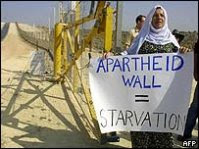Tuesday, March 6, 2007
UN’s warning about Gaza: 80% of Palestinians are starving
 by Umberto De Giovannangeli
by Umberto De Giovannangelil’Unità 05/03/07
It’s not a warning cry. It’s much more. It’s an X-ray of a situation that is by now far beyond the humanitarian crisis. It’s a figure-summarized account about over 800 thousand human beings, women, children, men whose daily survival and sustenance are today totally dependent on international aid. This is what is reported by the last account about the Gaza Strip that has been conceived by the UN’s World Food Program and that “l’Unità” has been able to preview.
The 80% of Gaza’s population relies upon WFP’s aid and on that from the UNRWA, the UN agency for refugees. “Without this help, dozens of thousands of families couldn’t get by. Their condition is one of thorough indigence,” the WFP’s spokeswoman for the Territories, Kirstie Campbell told l’Unità. It is much more than an emergency.
The situation that has been witnessed and denounced by l’Unità in the past months, is worsens with each passing day and WFP’s account confirms that with blood-curling figures. Such as this one: 46% of the Territories’ inhabitants (Gaza and West Bank) stand no chance of having access to what is perceived as being a “balanced feeding” according to WFP’s lowest standards.
“That means,” Campbell continues, “that 46% of Palestinians is unable to produce and/or have access to a necessary minimum nourishment in order to lead a healthy and active life.”
In the Gaza Strip—another distressing figure statess—four out of five Palestinians are living under the level of poverty (two dollars a day per capita). The first victims of this situation are children and the elderly. Further anguishing data: 51% of Gaza’s children suffer from severe vitamin deficiencies and growth is compromised for many of them. “We see more and more children coming to school without being able to have their breakfast and buy something to eat,” WFP’s spokeswoman says. “Many families can provide their children only with one meal a day. The situation is particularly serious in Gaza, yet worrying news is starting to come from the West Bank as well.”
As to the elderly, in the last year deaths being due to an “irreversible organic weakening” (starvation) rose by 38% from the previous year. The appraisal of life conditions resulting from the account is desperate. That is a word Kirstie Campbell repeats many times during her account.
Indigence is expanding to social groups who were only affected by it only recently. Whereas in the past, the UN food agency’s account reports, the scarcity of primary food concerned mainly the rural zones, now it is a phenomenon also affecting Gaza city dwellers and the social categories—traders, state officials—regarded as “privileged”.
The Palestinian economy is increasingly similar to a “swap-depending economy”. The WFP fixes up 1,6 dollars per capita a day as the level of “food indigence”; 1,6 dollars a day is the minimum required for a nutritionally sufficient alimentation.
In Gaza, one hundred thousand people don’t eat anything but tomatoes and bread. It’s not only about figures. It’s faces, stories telling about a situation getting more desperate. With everything happening in the silence of the international community and in the moral, as well as political, bankruptcy of a Palestinian leadership whose sole interest seems to be that of the rising national unity government’s spoil system.
It’s the story of little Dana (8), of her seven brothers and sisters, of her parents, Yusuf and Basma. It’s the story of the Hassein family. Since 2004, Basma says, the feeding of her children has always been the same: pitta and humus, with every child drinking a cup of tea in the morning. Once a week, if lucky, they manage to eat chicken or red meat. No dairy products, no vegetables, neither rice nor pasta. Without WFP’s help, Dana’s and her brothers’ fate would be already settled. They wouldn’t exist at all.
Since it’s only thanks to UN’s assistance that the Hassein family, and further tens of thousands like it, receive, every two weeks, flour, salt, cooking oil and tea.
This is the daily “life” within that sort of prison, isolated from the world, that Gaza is. This is the “life” that is fading near the Wall that shatters the West Bank in a thousand ghettos. Indigence. Despair. All but a total dependence on humanitarian agencies. A situation, WFP’s report denounces, that has been getting even worse since the thousands of Palestinians who used to go every day to Israel for work found themselves unemployed as a result of the Israeli authorities’ provisions concerning security and after the building of the separating barrier.
Translated from Italian by Diego Traversa and revised by Mary Rizzo, members of Tlaxcala, network of translators for linguistic diversity.
Labels: documents, human rights violations, Israel, Palestine, Wall







